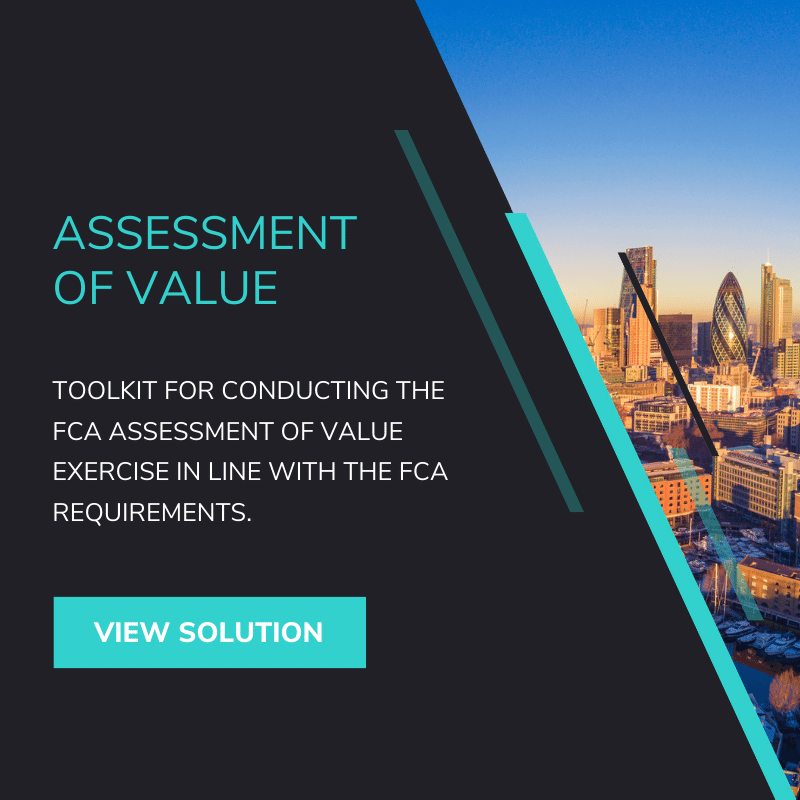In this, the second of our series on FCA Assessment of Value, we consider whether the FCA Assessment of Value process will lead to real change in product governance processes for the benefit of investors, or if firms will use this merely as a “tickbox” exercise to satisfy a regulatory requirement.
“FCA Assessment of Value is already an integrated part of our product governance and we dealt with all shareclass issues as part of the RDR process.” Wishful thinking!
Some Managers may argue that product governance under MiFID 2 and PRIIPS, as well as the RDR changes from 2012, have already dealt with the issues around value for money.
However, given that ESMA research has shown that retail investors can pay up to twice as much as institutional investors for substantially similar products, and that the FCA’s research in the Asset Management Market Study found evidence of weak price competition and did not find any clear relationship between fund charges and fund performance, it is unsurprising that regulators are seeking significant change in how firms view and respond to FCA Assessment of Value.
Christopher Woolard, the FCA’s Executive Director of Strategy and Competition said:
“The investment choices open to people, and the decisions they make on how to invest, can have a profound impact on their financial health. They can also have consequences for their families, as well as society as a whole. That’s why it is important the asset management industry, which looks after the savings of millions of investors, is working as well as possible. But our market study found evidence of weak price competition in a number of areas.”
“Today’s announcements are an important part of a package of measures that, combined, aim to achieve a fair, transparent, open and accountable market.”
With the first batch of assessments expected in January 2020 and further reports due over the coming months, we have already seen the new rules being embraced by many across the industry which can only lead to a myriad of benefits to investors.
INTENDED BENEFITS
The new rules aim at strengthening the duty of asset managers to act in the best interests of their investors through increased scrutiny carried out by the board of the fund manager, and greater transparency via the annual reports.
The intended benefits of the FCA Assessment of Value requirement include:
- lower prices for investors;
- better quality service;
- greater innovation through more effective competition; and
- improved transparency.
FCA Assessment of Value can also serve the purpose of building greater trust and confidence in the asset management industry.
Although the potential benefits of AOV cannot be denied, the real question is whether it will lead to real change from the industry or whether the industry will merely pay lip-service. In our view, it will lead to real change and indeed we are already seeing this as well as a number of additional consequential impacts on the industry.
PRACTICAL CONSEQUENCES FOR THE INDUSTRY
In addition to the FCA’s stated benefits for investors, we foresee the following consequences of change, both short-term and long-term:
- In the short-term (Year 1), the consequences will include remedying of outlier fund and shareclasses by Managers, including:
– Closure of legacy Retail Distribution Review (RDR) shareclasses;
– Some shareclass consolidations / closures; and
– Some reduction of outlier charges. - Over the longer-term, the FCA Assessment of Value exercise will be another driver in the push towards a smaller number of larger funds and in the shift from active to passive fund management strategies.
Although the new rules are less interventionist than some of the proposals initially mooted by the FCA, there is still reason to be optimistic about the rules leading to real change and fund managers delivering greater value for customers.
FUNDS-AXIS VIEW – REAL CHANGE
In our view, the FCA Assessment of Value process will lead to real change, for a number of key reasons:
- The new prescribed responsibility for Boards and Senior Management and the requirement to make public the results of the fund assessments will mean that the exercise is taken seriously;
- With fund now having to justify their pricing and consumer outcomes publicly, reputations will be at risk;
- After the first round of reporting, we can expect the emergence of statements on good and poor practice that will lead to even further improvements being made;
- For larger managers, with fund ranges in multiple domiciles, this will include reviewing the ranges across all domiciles;
- The ready availability of whole-of-market industry data (as used in the Funds-Axis AOV solution) makes it straightforward for regulators, the financial press, distributors and investors to all perform a wide range of comparative analysis and scrutiny in respect of costs, risk, performance and closet trackers.
THE NEED FOR BETTER STATISTICS
In Episode 3 of our FCA Assessment of Value blog series, we consider the last point above in more detail. We consider how whole of market data can be used to support the FCA Assessment of Value exercise, but also the dangers that lie ahead in taking a statistical approach, overly focusing on the quantitative as opposed to qualitative factors when considering FCA Assessment of Value.
Request a Demo
Error: Contact form not found.













